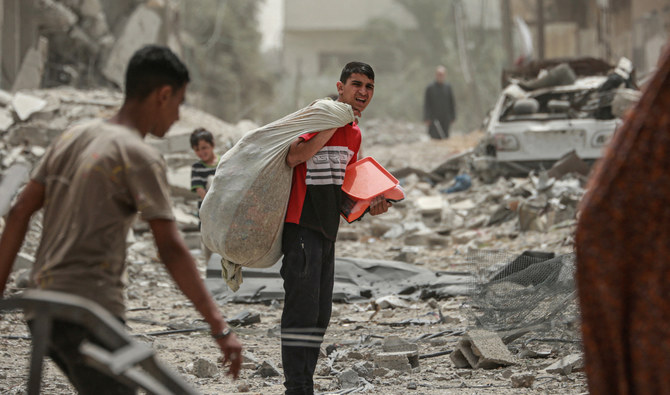
In her annual report to the UN Human Rights Council that was released last week, High Commissioner for Human Rights Michelle Bachelet devoted a short passage to the abuses of Palestinian human rights in the territories occupied by Israel. Despite its conciseness, it was damning, which should deeply worry those who believe that Israelis and Palestinians can one day live together peacefully, while respecting each other’s rights.
Bachelet expressed her concern at the deteriorating situation in the Occupied Territories, mainly from what she described as “a dramatic rise in the number of Palestinians killed by Israeli forces.” In one year, the number of Palestinians killed in these circumstances went up tenfold, from 32 in 2020 to 320 in 2021. And if it is not the security forces that are showing contempt for Palestinian lives, the high commissioner’s report warned that settler violence is also on the rise, not only in the number of incidents but also in their severity. Furthermore, with the almost absolute power that Israel exerts over Palestinians, arrests also doubled in 2021, including an increase of 30 percent in cases of “administrative detention,” which typifies the arbitrary nature of the occupation by depriving detainees of their freedom without due legal process, let alone conviction.
Occupation as a form of repression has many faces and all of them are looking to ensure that the occupied feel despairing and hopeless to the point that they lose the will to resist. There is an Israeli military presence almost everywhere in the West Bank, including incursions into areas that are supposed to be under complete Palestinian Authority control. Soldiers use force at will, detaining both adults and children with no shred of evidence of lawbreaking, and in certain cases using vastly excessive force that leads to the killing of Palestinians with almost complete impunity.
For example, Amar Shafiq Abu Afifa, a 19-year-old college student, was this month shot dead by an Israeli soldier while he was hiking with a friend. According to a B’Tselem researcher who investigated the incident, he was shot in the head as he ran away in fright after hearing the soldier shouting in Hebrew, even though he posed no threat. Just a few days earlier, Israeli forces shot dead a 13-year-old Palestinian boy, Mohammed Rezq Salah, near Al-Khadr village in the West Bank. According to the Israeli authorities, the boy threw a Molotov cocktail at Israeli forces. Even if this was the case, one would think that highly trained soldiers could have neutralized a boy of this age without killing him.
These are only two examples of lives lost in an asymmetric conflict that, the longer it continues, the more it is locked into a deadly routine in which the lives of Palestinians tragically count for very little. The imposition of the will of one people on another with the use of overwhelming military force — while also utilizing its economic might and somehow enjoying the support of the most powerful country in the world and as the rest of the international community turns a blind eye — is creating among the Palestinians a sense of hopelessness, as well as deep anger at the profound and daily injustices perpetrated by the occupiers.
The longer the conflict continues, the more it is locked into a deadly routine in which the lives of Palestinians tragically count for very little.
Yossi Mekelberg
Last month was particularly violent and the UN Office for the Coordination of Humanitarian Affairs produced a long list of what can only be described as the constant harassment of Palestinians, including confiscating, demolishing or forcing owners to demolish their own homes or other structures in Area C, which is under complete Israeli control, and East Jerusalem, which was illegally annexed by Israel. Whenever these occurrences take place, they negatively affect the lives of Palestinians, displace families, including young children, and end in the loss of livelihood. No wonder there is a deep and desperate resentment waiting to explode.
As part of its scare tactics, Israel has normalized the use of not only disproportionate force against militant opposition, but in many cases unwarranted and unprovoked violence against ordinary Palestinians. The OCHA reported that, in February, Israeli forces carried out 139 search and arrest operations against 198 Palestinians across the West Bank. By any standards, this was a deliberate and provocative escalation, which in some cases triggered clashes between Palestinians and Israeli security forces and perpetuated a vicious cycle, in which Israeli forces respond by killing and maiming protesters with live ammunition, rubber bullets and tear gas. This in turn provokes further protests. Many such Palestinian protests are against the expansion of settlements and the behavior of settlers, who are violently preventing Palestinian farmers from accessing their land to cultivate crops and feed their livestock.
Another extremely disturbing aspect of the Israeli occupation that did not escape Bachelet’s attention is the “repressive measures taken by Israel against human rights defenders and civil society activists, based on vague and unsubstantiated allegations, and with potentially far-reaching consequences for their activity.” One of the methods employed by Israel to suppress dissent among Palestinians is to harass human rights defenders and civil society organizations in a crude attempt to silence them and, by that, deprive the millions of people living under occupation of a voice and a leadership to counter injustice.
For instance, what began last July with a great trumpet blast from Israel’s Defense Minister Benny Gantz, when he designated six Palestinian human rights and humanitarian groups as “terrorist organizations” under the country’s counterterrorism law, has still not been backed up with evidence. After all, to accuse internationally and highly respected nongovernmental organizations of diverting funds to the Popular Front for the Liberation of Palestine, which is classified as a terrorist organization, is a very severe allegation, but where is the evidence? However, the damage to these groups has been done and the people who work for them know that they are watched and can be detained without trial indefinitely. In the meantime, the Israeli security forces remain free to operate as they wish with minimum scrutiny.
Considering the turmoil the world is currently engulfed in, it might be considered naive to expect the international community to pay much attention to or develop any coherent approach toward what is taking place in the Occupied Territories. Yet it is not unreasonable. That turmoil does not lessen the suffering of the occupied and the oppressed elsewhere and its potential consequences, to which the international community will be forced to respond when a situation for which it is partly responsible due to its apathy breaks down in a wholesale conflagration.
• Yossi Mekelberg is professor of international relations and an associate fellow of the MENA Program at Chatham House. He is a regular contributor to the international written and electronic media.
Twitter: @YMekelberg
Disclaimer: Views expressed by writers in this section are their own and do not necessarily reflect Arab News" point of view












